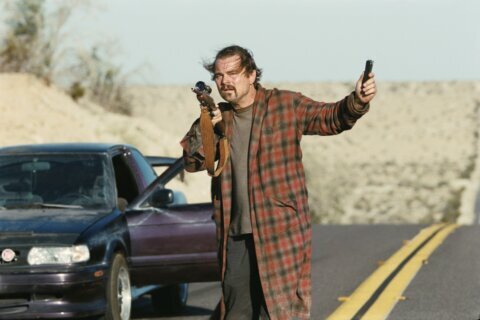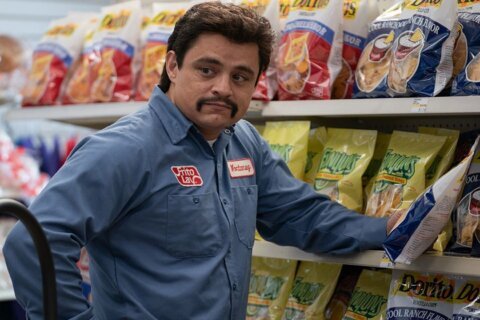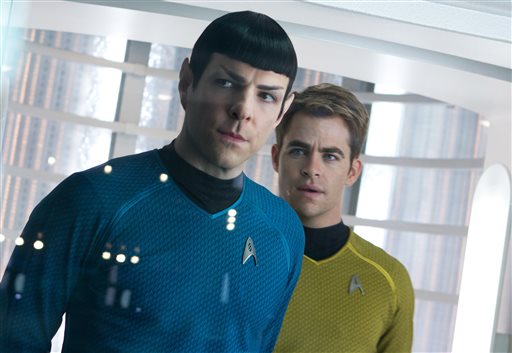
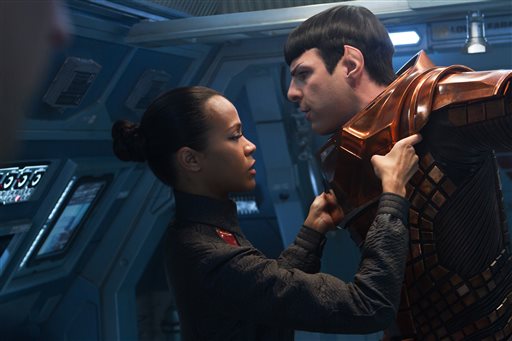
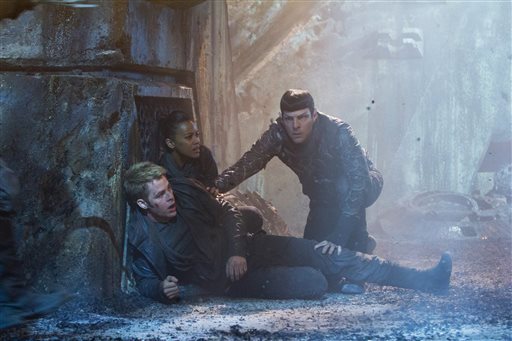
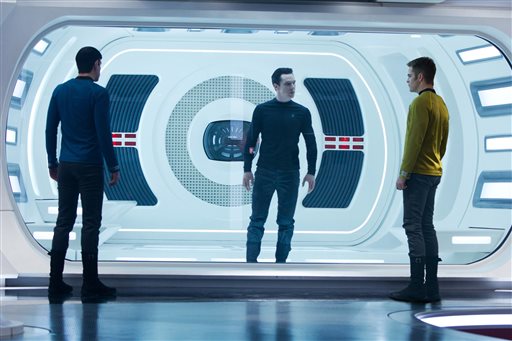
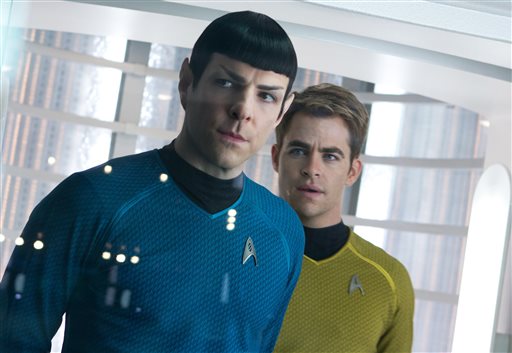
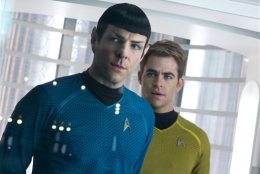
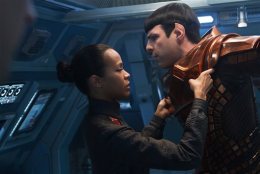

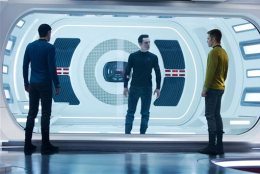
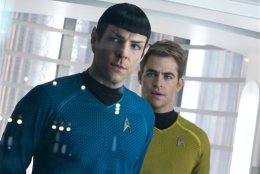
Jason Fraley, WTOP film critic
WASHINGTON – J.J. Abrams is officially Marty McFly.
He’s gone back in time, strapped on a futuristic suit and placed Van Halen headphones on our pointy ears: “Silence, earthling! My name is Darth Vader. I am an extraterrestrial from the planet Vulcan!”
That’s because Abrams has taken control of the two biggest sci-fi franchises in history, “Star Wars” and “Star Trek,” saluted by movie nerds everywhere with a double salute: “May the force be with you” and “live long and prosper.”
He was given the reins to “Star Wars: Episode 7” (2015) off the success of his 2009 “Star Trek” reboot, where Nero’s henchman did the Vader chokehold on Kirk and where Spock told his younger self, “I am not our father.”
Even then, it felt like Abrams was auditioning for the “Star Wars” gig, a suspicion he confirmed this week on “The Daily Show,” saying, “I never liked ‘Star Trek’ when I was a kid.”
To this Jon Stewart quipped, “I stopped listening to you when you said you didn’t like ‘Star Trek.'”
Congrats to Abrams for finally landing his Hollywood dream job, but such a concentration of power seems risky. Absolute power corrupts absolutely, and with great power comes great responsibility. One has to wonder whether the “Star Trek” sequels will now suffer under the Jedi force. The franchise will certainly live long, but will it prosper?
“Darkness” kicks off with a close-call mission to the Planet Nibiru, where Spock (Zachary Quinto) is almost killed. Admiral Pike (Bruce Greenwood) punishes Captain Kirk (Chris Pine) by relieving him of command of the U.S.S. Enterprise. After a terrorist attack on London, Admiral Marcus (Peter Weller) reassigns Kirk and Spock on a mission to the Klingon planet of Konos to stop a superhuman fugitive from within their own ranks (Benedict Cumberbatch). A quick glance at the IMDB cast list will spoil the identity of this familiar villain, but I won’t say anymore. You can discover it for yourself.
The stakes were high for this one, as any “Part 2” crarries high expectations in the “Star Trek” universe. “Star Trek II: Wrath of Khan” (1982) was the best of the original film series, while “Star Trek: First Contact” (1996) was the best of that iteration, thanks to a power performance by Patrick Stewart as Captain Jean-Luc Picard. “Into Darkness” may not quite live up to Abrams’ first, due to its length and.exposition, but there are enough surprises to keep us guessing.
Screenwriter Damon Lindelof (“Prometheus”) pairs with Abrams’ previous “Star Trek” writers Roberto Orci and Alex Kurtzman to craft a somewhat convoluted plot with admirable character growth. With each passing scene, the self-centered Kirk learns to live more for his crew than himself, while the robotic Spock gradually learns to feel human emotion.
This clash between Kirk’s maverick attitude and Spock’s by-the-book insistence creates laugh-out-loud buddy comedy in Act One and tear-jerking “bromance” in Act Three. Both actors should be commended for delivering in the footsteps of giants like Shatner and Nimoy.
Rather than serve as mere background decoration, the rest of the Enterprise crew grows too. Zoe Saldana’s Uhura speaks Klingon and insists Spock should fear death. John Cho’s Sulu shows a new toughness in the driver’s seat. Karl Urban’s Bones is called out for his “dammit” metaphors. Anton Yelchin’s Chekov gets new troubleshooting responsibilities. And Simon Pegg’s Scotty voices moral qualms to torpedo warfare.
The cast also introduces Alice Eve as the ship’s new crew member, Carol, who strips to a bikini yet figures crucial to the plot. There’s also Benedict Cumberbatch, who moves from his Sherlock Holmes role on British television to a skull-crushing villain more daunting than Nero. In many ways, this movie belongs to Cumberbatch, who at one point resembles a screaming David Bowie.
As much a character as any of these is Michael Giacchino’s music, which soars as the Enterprise rises from the wreckage. By the end credits, the score seems as if it’s been with us the whole time, when really it’s still just the third best, after Alexander Courage’s original TV theme and Jerry Goldsmith’s movie theme for “Star Trek: The Motion Picture” (1979). Dennis McCarthy cleverly combined both for TV’s “Star Trek: The Next Generation” (1987).
Still, the best part of “Darkness” is the USS Enterprise, which has never looked better. Abrams finally nails “warp speed,” as the 3D spaceship literally stretches as it charges its thrusters, then shoots off into the background, leaving a blue streak behind it. While the 2009 flick won the franchise’s first Oscar (Best Makeup), “Darkness” should be a contender for Best Visual Effects.
The visuals are enough to arrest any viewer, but the overall story is better suited for hardcore Trekkies. While Abrams said, “The goal was to make a movie for movie-goers, not just for ‘Star Trek’ fans,” the result is just the opposite with way too much inside baseball.
The key to the 2009 flick was that it cleverly created an alternate reality in an attempt to “go your own way,” like a Starfleet-wood Mac.
This peaked as Nimoy’s elderly Spock returned from the future to show Pine’s Kirk the formula for “beaming up.”
“You know, coming back in time, changing history, that’s cheating,” says Pine.
But Nimoy retorts, “A trick I learned from an old friend.”
By the end of the film, Nimoy’s elderly Spock flashes the Vulcan spread-finger salute and says, “At the risk of sounding self-serving, I will bypass my usual farewell and just say, ‘Good luck.'” This should have been the passing of the torch.
Instead, “Darkness” ignores Spock’s advice and becomes incredibly self-serving. The movie harkens back to the past constantly with quotes like, “The needs of the many outweigh the needs of the few,” but the movie plays to “the few” way more than “the many.” Abrams is so obsessed with proving he now “gets” the very references he once hated as a kid, that he compromises his story down the stretch.
Diehard fans will eat it up, but more casual observers will become lost in space. I was never a Trekkie, preferring the western elements of “Star Wars” instead. But I still got most of the references because I’ve been on a binge for weeks in preparation. My advice is to at least go back and watch “Wrath of Khan” before you trek to the theaters. It will make “Darkness” a much richer experience.
Which brings us to the film’s biggest moment, which I won’t spoil here. Let’s just say there’s an event that would have made this one of the most memorable “Star Trek” movies in the entire series. Unfortunately, Abrams knows there are more sequels and more money to be made, settling for an Act Three that cheats by allowing a do-over. What a shame.
Perhaps this comes from a TV mentality, where you can take as many mulligans and go on as many tangents as the ratings allow. Everyone knows Abrams is a visionary TV creator from “Felicity” (1998) to “Alias” (2001) to “Lost” (2004), earning the title of bonafied hit-maker, but the jury is still out on him as a hit sustainer.
“Lost” started off spectacular, but ultimately buckled under moving islands and an anti-climactic finale. “Super 8” started off as a great coming-of-age tale, but derailed into a cheap “E.T.” knockoff that forgot it was a “movie about movies.” I can hear Bones now, “Damn it J.J., you’re a starter, not a finisher,” wonderfully launching ideas, before quickly getting distracted.
This bodes well for “Star Wars: Episode 7,” but not for “Episode 8.” I have no doubt in my mind that Abrams will reboot the Jedi franchise with flying colors, but he should then immediately turn over the reins for “Part 2,” like George Lucas did for “Empire Strikes Back” (1980). We can already see his “Star Trek” fatigue setting in with “Darkness.” Like Spock after the destruction of the Planet Vulcan, Abrams may soon become “emotionally compromised” by his true love, “Star Wars,” and no longer be fit to steer the Enterprise.
No matter. After all the dust has settled and all the money has been made, history will still remember George Lucas for “Star Wars” and Gene Roddenberry for “Star Trek.” Where does that leave Abrams’ legacy? The Criterion Collection currently thinks it’s “Armageddon” (1998). Written by Abrams and directed by Michael Bay, it’s a sort of two-for-one deal to represent today’s sci- fi action blockbuster. I think it’ll be something in TV, a medium more suited to his attention span.
Roddenberry knew this universe well, making TV history by exploring strange new worlds, seeking out new civilizations and boldly going where no man had gone before. Abrams is giving her all he’s got, captain, but his “Star Trek” movies continue to go where plenty have gone before.
★ ★ ★
The above rating is based on a 4-star scale. Follow WTOP Film Critic Jason Fraley on Twitter @AboveTheJFray or on his blog The Film Spectrum.


